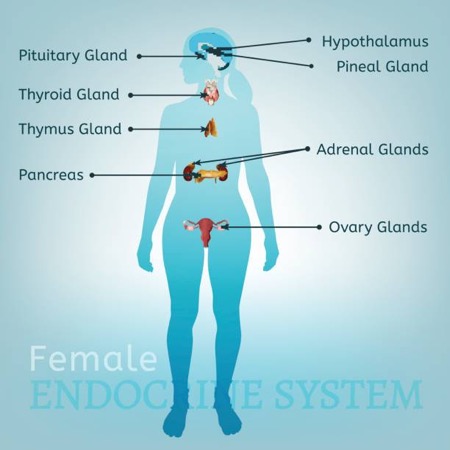We spoke with Nutritional Therapist, Nicki, about happy hormones and just what balanced hormone signs are. Hormones operate on a fine balance and so many things can knock them off kilter but how do we even tell? It’s likely we have days or weeks, or months, or even years where we don’t feel so great, but how to tell if this is hormonal or just us feeling a little ‘meh’? Nicki explains how hormones work and the main signs to look for an imbalance.
The hormones in our bodies are amazing things of biochemistry, responsible for the way we look, the way we feel, as well as our overall health and well-being in ways that many of us never expected or anticipated.
When our hormones are perfectly balanced, we feel fantastic, energized, mentally clear and focused, and as though we really have no worries at all. Sure, we may still have to contend with the daily stress and pressure that everyone has to fight through but when we are living with balanced hormones it doesn’t feel like much of a fight at all.
When we are dealing with a hormonal imbalance, however, nothing could be further from that reality.
We as women have to deal with bloating, irritability, mood swings that go one way and then another with no warning whatsoever, difficulty concentrating, significant stress at even the smallest of things, overwhelming fatigue even after we wake up, and sometimes more serious medical issues like infertility.

Because each and every hormone in our body has so much control over every individual cell and major bodily system it’s of the utmost importance that we do everything we can to corral our hormones when they go out of balance and bring them back to that “happy place”.
Thankfully, there are ways to figure out whether or not your hormones are running wild or if you’re dealing with balanced hormones instead. Each and every one of the tips and tricks below will help you better navigate to your hormonal situation, allowing you to better understand when you are beginning to deal with a hormone imbalance so that you can take the necessary corrective steps to bring things back to centre.
Are you dealing with a regular period?
The overwhelming majority of women are dealing with a menstrual cycle that lasts anywhere between 21 and 35 days, and most of them can set their watches to their menstrual cycle with the kind of accuracy that is a miracle biology.
However, medical researchers also report that there is about one quarter of women around the world that experience irregular periods that are closely linked to hormonal imbalance issues. These irregular periods may involve a much shorter block of time, a much longer block of time, or periods that are significantly lighter or heavier than the norm.
On top of that, women that struggle with this problem are also likely to deal with much more severe hormonal issues during these irregular periods. We’re talking about excessive weight gain, increased irritability and aggression, extreme cramping and pain, and a significant lack of ovulation.
If you’re dealing with irregular periods after a long block of time of regular periods, the odds are pretty good you’re dealing with a hormone imbalance that needs to be corrected.
Acne flareups are another sign of out of balance hormones
If you are dealing with acne (even as an adult) when you do not normally deal with acne at all, the odds are very good that you are dealing with a hormone imbalance in your body that is wreaking havoc on your skin, causing excessive oil production, and throwing your hormones all out of whack.
Hormones are going to elevate your testosterone level, depress your estrogen levels, and cause bacteria to run wild throughout the actual oil produced all over your skin. This is what kick starts the acne, but it is simply the symptom of the underlying hormonal issue.
There are a number of different hormonal imbalances that can lead to this kind of issue, but anytime you are dealing with a significant flareup – acne that spreads all over your face or your body – it’s very likely that your hormones are so out of balance that serious steps need to be taken to bring them back to balance ASAP.
Extreme fatigue is a dead ringer for hormonal imbalances
If you are waking up feeling more exhausted than you were when you went to sleep, or if even just the slightest bit of activity wipes you out and wears you down, the odds are very good that you are going to be dealing with hormones that are anything but balanced.
You’ll obviously want to track your sleep levels as much as possible, recording when you go to bed and when you wake up with pen and paper – or, even better, using technology to record your actual sleep cycles with your smart phone or tablet. This will shine a lot of light on the subject for you, letting you know if you’re dealing with a sleep issue caused by hormones that aren’t anything close to balanced or if you’re dealing with something else entirely.
Increased anger, aggression, and stress or emotionality is a symptom of hormone imbalance issues
We all have days where we just don’t quite feel ourselves, but when you are dealing with hormones that are out of whack you aren’t just going to feel like someone else – you’re going to act out a lot more, you’re going to feel aggressive and act aggressive, and you’re going to be under a lot more stress and may end up dealing with significantly higher levels of emotionality.
Balanced hormones aren’t going to stay balanced for your entire life, and you’ll need to make sure that you keep on the lookout for all of the signs and symptoms we highlighted above so that you can spot trouble on the horizon and take the necessary corrective steps to get out ahead of these problems and bring your hormones back to balance before they cause devastation.
 A registered Nutritional Therapist, with a diploma from the Institute of Optimum Nutrition – Nicki is also a Mother, wife and has had her fair share of hormonal issues, which led her to study nutrition and focus on hormonal health. For more information on Happy Hormones visit Nicki’s
A registered Nutritional Therapist, with a diploma from the Institute of Optimum Nutrition – Nicki is also a Mother, wife and has had her fair share of hormonal issues, which led her to study nutrition and focus on hormonal health. For more information on Happy Hormones visit Nicki’s
Leave a Reply